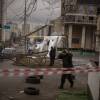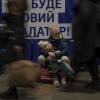After months of buildup, Russia has launched its long-expected invasion of Ukraine. But what comes next — within Ukraine, not just the international response — is less clear. Tufts University Professor Oxana Shevel, who specializes in the study of former Soviet states, joined Arun Rath on GBH’s All Things Considered to give the historical context, and why Russian President Vladmir Putin refers to Ukraine as being led by Nazis.
What follows is a lightly edited transcript.
Arun Rath: Professor, thanks for joining us.
More International News
Oxana Shevel: Thank you.
Rath: So let me ask you first, as someone obviously who knows the region well as been watching it as closely as anybody. Were you surprised at all by the timing?
Shevel: I would say that I was even surprised by the full-scale invasion. A lot of us who studied, you know, domestic politics in Ukraine and Russia were somewhat skeptical, I think, of this intelligence assessments that Putin would go for it all out war — because of the costs associated with it, not on the international course, but also cost domestically in Russia, potentially, creates risks to his popularity — this is not a popular war — and, of course, the extent of resistance that he will face in Ukraine.
Rath: And especially with those consequences you were talking about, those were very much part of the public consciousness in the last day or so.
Shevel: Definitely. I think it goes to show that Putin — you know, again, if we listen to his speeches, including this essay he wrote last summer about how Ukraine and Russia is essentially one country and Ukraine doesn't have the right to exist as an independent nation. And now this sort of fantastical worldview or, you know, delusion that he seems to hold of that, you know, NATO's going to attack Russia from Ukrainian territory, and Ukraine is run by Nazis. You know, it seems like he may unfortunately believe his own delusions, and his acting was that as primary driving force.

Rath: Let's talk a bit about that last point that you mentioned, because that's something that people who haven't watched the region as closely may not be familiar with here — may be hearing here for the first time this claim from Vladimir Putin that what he's doing is de-Nazification of Ukraine. Could you explain what he's talking about there?
Shevel: Yes. Well, I think it goes, you know, you almost have to take a historical view a little bit on this. But Russia and Ukraine obviously have cold history, but since Soviet Union collapsed and Ukraine became independent state, over time, Ukrainian identity became stronger and stronger. And, really, the galvanizing moment for it was the 2014 protests that led to the overthrow of the Russian president and ultimately Russian invasion for the first time, when Putin annexed Crimea and started war in Donbas. And this is when Ukraine was becoming, we can say, more and more lost Putin.
And some of the things that Ukraine was doing, you know, as it was establishing its national identity, people have questioned Soviet reading of history — including, for example, history of the Second World War. There was Ukrainian resistance movement during the Second World War that, yes, for a period of time, cooperated with the Nazis because they saw Soviet Union as an oppressor. And that was sort of strategic — right, we can say to some extent — alliance.
Now, the assessment of, say, a movement like this — from the Soviet point of view — is clearly manipulative. So this is a movement that is for the Soviet forces, and that's exactly why it's actually hated. Actually, it’s hated more for fighting the Soviet side than it is, really, hated for collaborating with the Nazis. And in Ukraine, there has been a lot of kind of historical reckoning with this — like, how do we treat a group like this, right? On the one hand, they’ve fought with Ukraine — on the other hand, they also committed crimes, right?
And that's domestic debate. We can say, you know, in the country that is struggling with this complicated past, is something that we can say is a domestic matter, right? But of course, then Putin completely overblows — not even just this incident, this sort of discussion — but the whole idea that basically any reading of history of the past, or doing anything that's not to Russia’s liking, is now labeled as Nazis, right?
So there are no Nazis running Ukraine. We have a Jewish president. Ukraine, for a while, was the only country, I think, in Europe to have both Jewish president and Jewish prime minister. According to any opinion poll, Russian speakers in Ukraine do not consider themselves to be oppressed. And yes, again, there has been no promotion of Ukrainians since the fall of the Soviet Union, when Russian was dominant language and Ukrainian was essentially suppressed in many ways, especially any political expression in Ukrainian.
So all of these things — we can say, “OK, Putin doesn't like it, but that's not the reason to start a war with your neighboring country.” Right? This is part of the domestic political process in Ukraine. So accusations of Ukraine being run by Nazis, or Russian speakers being suppressed, are completely inaccurate.
And moreover, and this is the last point I'll mention, I think if anything, that may turn out to be, kind of, the undoing of Putin's grand plan. Necause he seems to believe that Russian army will be met as liberators by these oppressed Russian speakers who are suffering under "Nazi rule." But that's not what's going to happen. We have ample evidence from opinion polls, from situation on the ground, that Ukrainians don't want to live under Russian rule. They do want to be free, and these feelings only intensified since Putin started aggression against Ukraine in 2014.
"What's going to happen if Russian tanks roll into Ukrainian capital city? What are they going to do? Sit on the main square and be surrounded by people who are going to tell them to go home?"
Rath: So with all of that, do we have any idea why Putin is attacking all over the country? Not just in these eastern areas that we've heard about being being contested, but from what we've heard so far of the reports, this is still ongoing — but it sounds like there are attacks all over Ukraine.
Shevel: Yes, because I think the very existence of Ukraine as an independent country that does its own thing — not what Russia wants it to do, but its own thing — including turning towards Europe, establishing anti-corruption institutions, building democratic competitive political system — is perceived for Putin, both threatening and unnatural.
It is threatening because, to have a country on its border, which is very similar culturally, historically actually has converted to a democratic regime, I think, is a major threat to Putin's authoritarian rule, right? If Ukrainians can have democratic elections, they can have orientation towards Europe, why Russia can't have that, right? This is a dangerous precedent to have on its borders.
And more broadly, I mean, he does seem to believe that Ukraine is just not a real nation, and so this doubly insults him — that here you have this nation, quasi nation, a nation, really, of Russian people who somehow have been brainwashed by these “Nazi rulers,” who happen to [have a] president [who’s] Jewish, but never mind that, right?
So I think his goal is really not just to have some sort of enclave in Donbas, where there was a stronger pro-Russian sentiment in 2014. But I think his goal is really to destroy what he considers to be historical anomaly.
Rath: Well, that sounds massive, right? Is this saying that Putin's goal, the end game here, is total control of Ukraine?
Shevel: I think that's exactly his end goal. And moreover, I think if we take his speeches at face value — or at least as an indication of how he thinks about these things — he seems to believe his own fantasy world. That Ukrainians are really Russians and say, opinion polls — he openly dismisses them — that show that Ukraine doesn't want to be part of Russia, or that people want to be part of Europe. He dismisses them as falsified preferences, or as people being afraid to express their true preferences.
So he's probably expecting in the quick and easy victory that, once Russian Army defeats the Ukrainian defenses and moves into Ukrainian cities, that people are going to be greeted as liberators. But that won't happen.
And this is sort of the question, I think for all of us watching this crisis, what is the endgame here? What's going to happen if Russian tanks roll into Ukrainian capital city? What are they going to do? Sit on the main square and be surrounded by people who are going to tell them to go home? Are they going to try to mow these people down? Like, these are the questions that we don't have answers for, because I think Putin is not expecting to face resistance, and he's expecting the “oppressed Russian speakers” to greet him as liberators, as he tries to present himself.
Rath: So as that unfolds, I imagine it might be hard to say at this point how long Russia could sustain something like that? Given resistance?
Shevel: That's exactly right. I think people like myself and my colleagues who studied domestic political process in Ukraine as well as in Russia, we have been very skeptical of this full-scale invasion exactly because control of Ukraine, without massive sustained occupation that really would be sort of, you know, like Nazi occupation of Europe, right? For many, many years going forward. That would be the only way to keep control of the country. Is Putin prepared to do this? I don't think he expects he will need to. But from where I stand, from my knowledge of the situation, I think that's exactly what he would be facing if indeed, Ukrainian army is defeated and Russian tanks begin to roll into the Ukrainian cities.
Rath: Professor Shevel, it's kind of a terrifying situation, but it is really helpful to be able to talk to you about this, for this context in detail. Thank you so much.
Shevel: Thank you.
Rath: That's Tufts University Professor Oxana Shevel. This is GBH’s All Things Considered.









